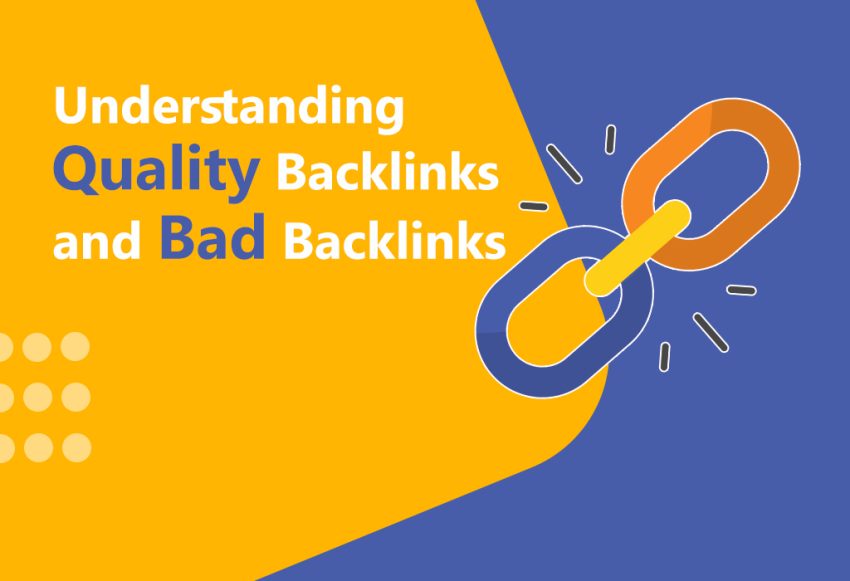A backlink is a hyperlink that links from one site to another. Backlinks play an important part in the process of optimizing search engines (SEO) and may affect the visibility and rank of a website in search results. In the case of backlinks, there’s an important distinction between good backlinks and low-quality backlinks.
Table of Contents
Quality backlinks
A high-quality backlink, also referred to as a high-quality link, is a hyperlink that originates from a trusted and reputable website and is then linked to another. Backlinks of high quality are considered valuable for search engine optimization (SEO) because of their positive effect on the visibility of a website and rank in search engines. Here are a few characteristics of high-quality backlinks:
Relevance:
Good backlinks come from websites that are relevant to the web page’s content. For instance, if you have a fitness-related website or health, a link from a well-known fitness website or a health-related website is important and useful.
Authority:
Backlinks that originate from trustworthy websites have more credibility. They are regarded as trustworthy and have a strong internet presence. Links from established, high-quality sites that have a positive reputation can significantly impact the authority of your site.
Organic:
Backlinks that are of high quality come naturally from high-quality content and trustworthy sources. They aren’t manipulated or manufactured to serve the sole purpose to boost rankings. Backlinks that are organically generated by search engines are valued more than those obtained through questionable practices.
Natural Anchor Text:
The anchor text can be described as the text that can be clicked inside a hyperlink. Good backlinks generally contain anchor words that are descriptive and pertinent to the page’s content. Natural anchor text adds contextual information and assists search engines comprehend the contents of the page linked to.
Engagement and Traffic:
High-quality backlinks are often the source of traffic to your site from other websites. When a reliable website hyperlinks to your site, it could bring genuine interest, resulting in an increase in traffic and engagement metrics such as time spent on the pages, time on site, and conversions.
Bad Backlinks:
Bad backlinks often referred to as spammy or low-quality backlinks are those that originate from sites with bad reputations or that use manipulative methods. Backlinks that are not properly constructed could have negative effects on a site’s search engine optimization (SEO) efforts and could cause penalties or a decrease in search engine positions. Here are some signs of backlinks that are not good:
Relevance:
Ineffective backlinks originate from websites that do not have any connection to your business or content. The presence of a lot of backlinks that are not relevant can cause red flags to search engines and could lead to penalties, or even a decrease in rank.
Insufficient Authority:
Linking that originates from sites that are not of high quality or have been deemed spammy can affect your website’s reputation. These websites might have no or little authority and may be involved in activities such as hyperlink farms, paid links, or overly reciprocal linking, which are against the guidelines of search engines.
Manipulation:
Backlinks that are not good are usually created artificially or obtained using black hat SEO methods. This can be done through linking schemes, exchanges of links, or employing automated tools to create hyperlinks. Search engines have become sophisticated in detecting manipulative practices, and they can punish websites that engage in these.
Insufficient Anchor Text:
Links with keyword-stuffed anchor text or that are irrelevant to the search engine are considered to be spammy. The over-optimized anchor text which doesn’t provide any useful information for users could be interpreted as a deliberate attempt to manipulate the ranking of search results.
Websites with a bad reputation:
Backlinks that originate from sites with a poor reputation, for instance, ones that are associated with malware or phishing content, are considered to be bad backlinks. These links not only affect your SEO, but they can also affect your website’s credibility as well as user confidence.
In short, high-quality backlinks are from authentic, trustworthy, and organic sources. Bad backlinks are ineffective, low-quality, and manipulative or are associated with harmful websites. It is vital to focus on creating a variety of high-quality backlinks by using organic and ethical ways to improve your website’s SEO efforts.
Read more:

